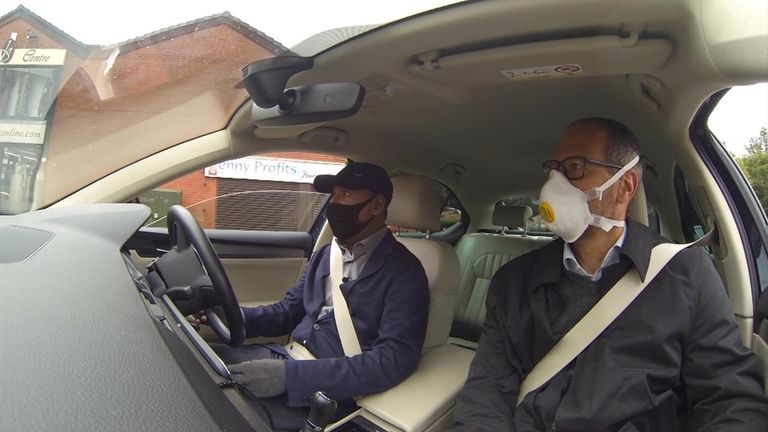A new £500m funding package to support trials of a 20-minute coronavirus test has been hailed by the health secretary as a "huge step forward" in the fight against COVID-19.
Matt Hancock told Sky News the government wants to "go further" when it comes to mass testing for the virus.
:: Follow live coverage of the latest coronavirus news and updates
"Being able to expand mass testing with these new technologies is a huge positive step forward in our battle against the virus," he told the #KayBurley programme.
"If you think about it, a combination of everybody doing social distancing and then testing to find out where the virus is is our best way of avoiding having to do local lockdowns and our best way of keeping the virus under control."
Mr Hancock said part of the money will also go towards efforts to explore the benefits of repeatedly testing people for the virus, with a new community-wide repeat population testing trial set to be launched in Salford, Greater Manchester.
Existing trials in Southampton and Hampshire, using a no-swab saliva test and a rapid 20-minute test, will be expanded through the new funding.
The Department of Health and Social Care (DHSC) said saliva-based testing will be used for the Salford pilot, which will involve the city council and other local partners.
A select number of residents will be invited for a weekly test, with the pilot performing up to 250 tests a day.
The initial focus will be on high footfall areas of Salford, such as retail areas, public services, transport and faith spaces.
Its aim is to identify positive coronavirus cases early, including for those with no or minor symptoms, so people can self-isolate.
Results will inform how regular repeat community testing could be scaled up across the country.
The second phase of a no-swab saliva test pilot is due to begin in Southampton this week.
It will see a weekly testing model trialled with more than 2,100 pupils and staff across four schools.
The work is led by a partnership of the University of Southampton, Southampton City Council and the NHS.
Meanwhile the pilot of a rapid 20-minute coronavirus test will be expanded "to further explore the applications of mobile testing in different settings" in Hampshire, the DHSC said.
Funding will also be used to extend capacity for existing polymerase chain reaction (PCR) testing currently being used in the UK.
Mr Hancock also told Sky News that the overall testing regime was working "well" - despite some people being directed to centres more than 100 miles away.
He said this issue was part of the reason why the government was investing in trials of 20-minute tests.
"At the moment the system works well. Of course there are operational challenges from time to time but it works well," he told Kay Burley.
"And we're finding a higher and higher proportion of people in the country who have coronavirus and getting them tests so they can be looked after.
"But absolutely we need to roll out more testing - we have done throughout this crisis and today's another step in solving some of those problems with the existing technology."
Baroness Dido Harding, interim executive chairwoman of the National Institute for Health Protection, the body replacing Public Health England, said: "New testing technologies and methods are vital to keep the system evolving and improving, especially as we assess how routine testing could help pick up cases of the virus earlier.
"We will continue to scale up our testing capacity by expanding our network of testing sites and investing in new technologies to reach even more people through NHS Test and Trace."
:: Subscribe to the Daily podcast on Apple Podcasts, Google Podcasts, Spotify, Spreaker
It comes as a study published in the online journal BMJ Open suggested people who have COVID-19 should be swab-tested again four or more weeks after symptoms first appear to minimise the risk of onward infection.
This is because SARS-CoV-2, the virus responsible for COVID-19 infection, takes an average of 30 days to clear from the body after the first positive test result and an average of 36 days after symptoms first appear, the study findings show.
It is not yet known how infectious a person may be in the recovery phase, the researchers warned.
The findings also indicate that the rate of false negative test results - whereby people are falsely reassured they no longer have active (shedding) virus in their bodies - is relatively high (one in five) in early convalescence, so putting them at risk of unwittingly passing on the infection.
An accurate assessment of how long it takes the body to clear SARS-CoV-2 is key to curbing the risk of onward infection and minimising the enforced isolation period for patients who no longer have symptoms, say the researchers.
The large population-based study was carried out by tracking the progress of 4538 residents of the Reggio Emilia province in the Emilia-Romagna region of Italy, all of whom tested positive for the virus between February 26 and April 22 this year.
https://news.google.com/__i/rss/rd/articles/CBMicmh0dHBzOi8vbmV3cy5za3kuY29tL3N0b3J5L2Nvcm9uYXZpcnVzLTUwMG0tZnVuZGluZy1wYWNrYWdlLXdpbGwtc3VwcG9ydC10cmlhbC1vZi0yMC1taW51dGUtY292aWQtMTktdGVzdC0xMjA2MjEwNtIBdmh0dHBzOi8vbmV3cy5za3kuY29tL3N0b3J5L2FtcC9jb3JvbmF2aXJ1cy01MDBtLWZ1bmRpbmctcGFja2FnZS13aWxsLXN1cHBvcnQtdHJpYWwtb2YtMjAtbWludXRlLWNvdmlkLTE5LXRlc3QtMTIwNjIxMDY?oc=5
2020-09-03 06:40:12Z
52781039076625


Tidak ada komentar:
Posting Komentar